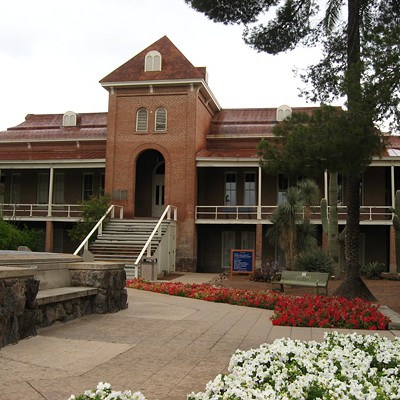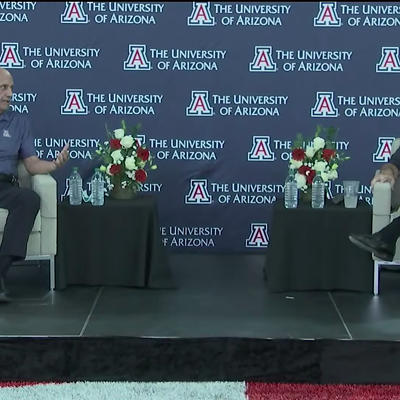Leal looks at the letter, shakes her head and sighs. It marks the end to a fight between UA officials and Leal, a 51-year-old student who recently returned to school. The fight started after she noticed that $482 was taken out of her financial-aid check last year, with another $527 taken out this year--charges that had nothing to do with tuition.
Leal says the only reason she looked so closely at her financial-aid statement and noticed the charges is that she worked so hard to finally qualify for the student loans that allowed her to go back to school full-time.
Before that, she was a part-time student at Pima Community College, and used part of her 401(k) to pay her expenses. Leal retired in 2000 from her job selling advertising for Dex phone books and decided to go back to school to pursue a career in the legal field. Her goal is to get a paralegal job with a major law firm--but she found out that all paralegals at the firm need a bachelor's degree, Leal says.
So Leal returned to the UA, the same place where she started her university schooling back in mid-1970s.
Life got in the way of her obtaining her degree back then, Leal says. She married, put her then-husband through school, divorced, financially helped her family, and then cared for her elderly mother until she passed away.
Putting her needs first didn't happen--until Leal decided to go back to college.
Leal says that when she first applied for financial aid, she found out she didn't qualify, because her tax records still reflected the income she made at Dex.
"When I finally qualified (for financial aid), I was so thrilled. I looked over every inch of that statement. I'm sure most students don't look over their statements, but most students aren't 51 and going back to school after all these years," Leal says.
That's when she noticed the $482 excess-credit surcharge. She was told by a financial-aid clerk that the surcharge is "for taking up the classroom seat of an individual that is on course to graduate in a timely manner."
Those penalized with the surcharge usually have earned more than 145 credit hours--technically more than enough for most students to graduate. Leal learned there is indeed a statutory credit threshold at Arizona public universities--and she evidently exceeded that threshold because of the credits she earned three decades ago, when she wasn't taking classes to become a paralegal.
In late June, Leal wrote a letter to Dan Anderson, assistant executive director for institutional analysis for the Arizona Board of Regents, challenging the surcharge and its legality. Without responding to Leal, Anderson forwarded the letter to UA officials.
In late July, Leal heard back from Beth Acree, UA senior associate registrar, who explained the surcharge. Leal's records were reviewed, and she was told she did meet the surcharge criteria. Also, since the surcharge was an official tuition fee, it could legally be paid through financial aid.
"But I was frustrated no one ever explained exactly what those requirements were, and while I asked, no one ever explained if there was an appeal process available to me," Leal says. "I wasn't satisfied."
In addition to writing to the Arizona Board of Regents and UA officials, Leal wrote to her political representatives, including U.S. Rep. Gabrielle Giffords, state Sen. Charlene Pesquiera and state Reps. Nancy Young Wright and Pete Hershberger. Only Giffords' office responded right away; officials there told Leal that Giffords' office did not have jurisdiction in the matter, but they sent a letter of concern to UA President Robert Shelton, asking that he look into the matter.
Giffords' letter may have led to another letter that Leal received, from Acree's boss, Dr. Paul Kohn, vice provost of enrollment management, who explained that the surcharge was out of the UA's control.
"The cost of a student's education is covered through a balance of funding from the state of Arizona and from tuition assessed to the student. When the state portion goes down, the cost to the student must go up in order for the university to maintain the level of funding needed to cover the regular costs of providing a university education," Kohn wrote.
Leal had now received three somewhat differing explanations from three different UA officials.
However, in late August, Acree sent a letter to Leal admitting a mistake: Leal fit a surcharge exception.
"I guess the appeal process is writing your congressperson and state representatives," Leal says. "I got my money back, but the whole process has left me wondering how many other students get imposed this penalty and don't even realize it. I wondered if most were financial-aid-receiving students, because it's easier to take the money from their financial aid rather than charge students who pay cash."
According to Acree, students who meet the criteria and pay cash are also charged the assessment. When asked if the UA could provide data on the number of students who are impacted by the penalty, and how those students pay, Acree said she would provide that information. (As of press time, we have yet to receive those figures.)
Acree says after sending that first letter to Leal, she looked at her records again and realized the financial-aid office wasn't looking at the hard copy of her transcript. When students like Leal return with a hard copy, those credits are transferred to an electronic system that's been in place since 1989--but the system didn't reflect when those previous credits were earned.
Acree says Leal qualified for a surcharge exception because she had been away from school for more than 24 months. Acree adds that her office has now introduced a new system to check transcripts.
According to minutes from an Aug. 10, 2006, Board of Regents meeting, the board approved the surcharge after state statutes were revised in early 2006 to provide exemptions from a 2005 package of statutory charges aimed at students "accumulating too many unnecessary course credits and, therefore, moving to inefficiently toward the completion of a baccalaureate degree."
But Leal isn't exactly a professional student like Van Wilder.
"Return students like me, we are great students to have on campus. We actively participate in the classroom, and at the end of the day, we go home to study," Leal says.













